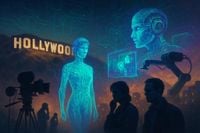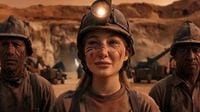Hollywood finds itself at a crossroads, confronting a technological revolution that’s rapidly reshaping the very foundations of filmmaking. As of October 1, 2025, artificial intelligence isn’t just lurking in the background—editing footage or generating digital extras—it’s stepping boldly into the spotlight, both as on-screen talent and, more controversially, as the creative force behind the camera. The recent unveiling of the world’s first AI actor, Tilly Norwood, and the debut of The Sweet Idleness, a film helmed by a virtual director named FellinAI, have ignited fierce debate and existential anxiety across the entertainment industry.
It all began with a jolt at the Zurich Summit on September 27, 2025, when Dutch producer and comedian Eline Van der Velden introduced Tilly Norwood, an AI-generated performer crafted by her company Xicoia. Marketed as the world’s first AI actor, Norwood’s debut—a brief comedic video entitled "AI Commissioner"—sent shockwaves through Hollywood. Van der Velden defended her creation, stating, “Tilly Norwood is not a replacement for a human being, but a creative work—a piece of art,” and likened AI to "a new paintbrush" that expands creative possibilities. Yet her bold claim that Norwood could be "the next Scarlett Johansson or Natalie Portman" only fueled industry anxieties.
The backlash was immediate and intense. SAG-AFTRA, the union representing screen actors, issued a statement on September 30, 2025, declaring, “creativity is, and should remain, human-centered. Tilly Norwood is not an actor, it’s a character generated by a computer program that was trained on the work of countless professional performers—without permission or compensation.” The union’s message was clear: AI-generated characters threaten the essence of acting, a craft deeply rooted in human experience and emotion.
High-profile actors quickly joined the outcry. Emily Blunt didn’t mince words, exclaiming, “Good Lord, we’re screwed. That is really, really scary.” Whoopi Goldberg, speaking on "The View," lamented the “unfair advantage” of competing against AI trained on thousands of human performances, while Natasha Lyonne called for a boycott of any talent agency engaging with such technology. Director Luca Guadagnino painted a dire picture, stating that the rise of an “AI actor” could signal the “end of the industry as we know it.” According to Deadline, these reactions underscore deep-seated fears—job displacement, loss of creative control, and the ethical quagmire of using human performance data without consent or compensation.
Amid this uproar, another AI milestone quietly arrived. On October 1, 2025, Italian producer Andrea Iervolino unveiled The Sweet Idleness, a film he claims is the first to be directed by a virtual AI director, FellinAI. Housed at Andrea Iervolino Company AI, FellinAI is overseen by Iervolino himself as the “human-in-the-loop”—a blend of supervisor and producer who guides and monitors the technology. The film, according to Deadline, imagines a future where only 1% of humanity still works, with labor becoming a symbolic ritual and the rest of the population living in leisure under the care of machines. The cast, too, is digital, created by Iervolino’s Actor+ agency, which provides digital likenesses of real actors for FellinAI to direct. No release date has been set for the film, but Iervolino insists his project is a “new chapter in the history of cinema,” aiming “to unite human sensitivity with the creative power of artificial intelligence in order to tell stories that no one has ever imagined before.”
While the emergence of AI directors like FellinAI has not yet sparked the same public uproar as AI actors, the trend is unmistakable. Companies such as ReelMind.ai have launched intelligent creative partners, like the "Nolan AI Agent Director," intended to democratize filmmaking by streamlining scriptwriting, story development, and even casting. These tools promise to make production more efficient, but they also raise tough questions about artistic authorship and the future role of human directors. The 2023 SAG-AFTRA strike, which included AI use as a central bargaining point, reflects the industry’s growing apprehension about maintaining human control and fair compensation in an increasingly automated environment.
The business implications of Hollywood’s AI revolution are profound. Studios like The Walt Disney Company, Netflix, and Warner Bros. Discovery stand at a crossroads. On one hand, AI offers unprecedented cost reductions and creative efficiencies—automating everything from script analysis to visual effects, and even generating digital environments or de-aging actors. According to Market Minute, Netflix is already using AI to accelerate complex VFX work, potentially boosting profit margins and content output. Studios with vast intellectual property libraries, such as Disney, could leverage AI to create new narratives or maximize existing assets.
But there’s a flip side. Studios risk alienating talent and facing union backlash, legal fights over likeness rights, and demands for AI-specific compensation. Over-reliance on AI could also erode creative authenticity, possibly turning off audiences who crave the “human touch.” Those studios that navigate these challenges with sensitivity and ethical foresight may thrive, while others could face reputational damage and market volatility.
Visual effects companies like Industrial Light & Magic and Weta FX find themselves at the epicenter of these changes. AI is revolutionizing VFX by automating labor-intensive tasks and generating photorealistic environments and characters at lightning speed. This could mean more business for firms that adapt, but also a potential 80% reduction in traditional VFX jobs as generative AI matures. The key for these companies, as Market Minute reports, will be investing in proprietary AI tools and upskilling their workforce.
Talent agencies are perhaps facing the most existential threat. If studios can generate digital performers at will, the demand for human talent—and by extension, agents—could plummet. Some agencies are exploring representing digital likenesses or AI creators, but the fierce backlash against Tilly Norwood demonstrates the ethical and PR minefield involved. Agencies that adapt quickly, mastering the legal and business nuances of AI representation, may find new opportunities, while those clinging to the old model risk obsolescence.
Meanwhile, tech giants like Adobe, NVIDIA, and Alphabet are emerging as clear winners, supplying the foundational tools and infrastructure for Hollywood’s AI transformation. Adobe’s Creative Cloud suite, NVIDIA’s GPUs, and Google’s generative video tools are now indispensable. These companies are poised for significant growth, though they, too, must tread carefully around copyright and ethical issues.
This reckoning isn’t unique to Hollywood. The music and publishing industries are experiencing parallel AI revolutions, raising similar concerns about job displacement, content quality, and intellectual property. Regulators are scrambling to keep up, with the U.S. Copyright Office maintaining that works created solely by AI aren’t copyrightable, and new laws in California, New York, and Tennessee requiring explicit consent for digital replicas. The 2023 Writers Guild of America and SAG-AFTRA strikes led to historic agreements: AI cannot receive writing credit, and actors must give informed consent and be compensated for any AI-generated use of their likeness or voice.
Historically, Hollywood has weathered disruptive technological shifts before—from the advent of sound and color to the rise of CGI. Each time, the industry adapted, new roles emerged, and creativity found new forms. The rise of AI is likely to follow a similar trajectory, with the industry ultimately finding a balance between human artistry and machine efficiency. As Market Minute notes, the most likely future is one of "regulated coexistence," with AI augmenting rather than replacing human creativity and robust frameworks ensuring fairness and transparency.
For now, as studios, unions, and tech companies negotiate this new landscape, one thing is certain: the debate over AI in Hollywood is far from over, and the outcome will shape the stories we tell—and how we tell them—for generations to come.






